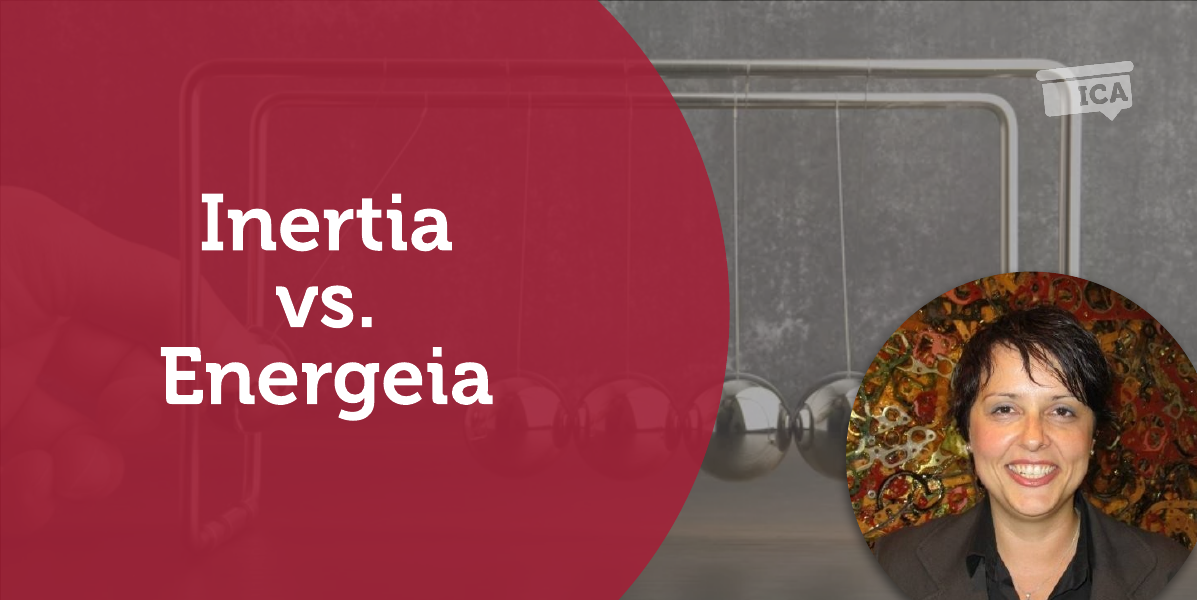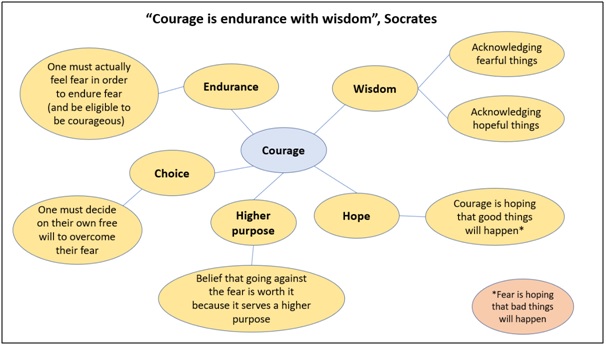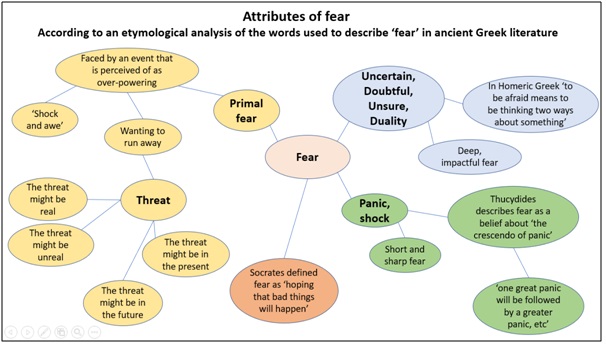
A Coaching Power Tool Created by Paraskevi Theodoropoulou
(No Limits Coach, FRANCE)
1. Introduction & motivation
What motivated me to create this power tool was my reflection about what it means to support clients to find the No Limits version of themselves (within my No Limits coaching model). I realised that to start being No Limits it is necessary not only to break inertia but to get into the mindset of fully putting potential into practice. This spontaneously made me think of Aristotle’s theory of energeia and Isaac Newton’s laws. Hence, I created this power tool, which I started using in my No Limits coaching model.
2. The perspective of inertia
According to Isaac Newton’s laws
inertia is the resistance of any physical object to any change in its velocity. This includes changes to the object’s speed, or direction of motion (Encyclopaedia Britannica).
To overcome inertia, it is necessary to apply a force that will make something start moving, slow it down, or change the direction of its movement.
This scientific theme describes very well what clients experience when they feel they are unable to change or influence their lives, their destiny. They continue living day after day, in the same way, with the same thoughts, the same emotions, the same behaviours, … very much like an object that continues its movement at the same speed and in the same direction. They are trapped in a state of inertia.
If they stay in this state of inertia, one thing is sure: nothing will change. No new result will appear. Employing Newton’s law, only if a new kind of force is applied in the client’s system (the client’s world) will something change. And in the case of coaching, this ‘force’ that can overcome inertia is the client’s own perspective on themselves and on their situation.
What inertia feels like
Clients that are trapped in inertia use expressions like:
The perspective of inertia
As evidenced by the client expressions above, the perspective of inertia could be described as ‘I am stuck in the life I currently have because I don’t have options; because I am afraid if I change anything I will suffer worst consequences; because I am powerless against the environment I am in”.
This perspective of inertia is produced through an internal thinking mechanism. The client interprets their situation in a certain way, which gives rise to emotions of fear, which in turn make the client adapt their behaviour.
3. The perspective of energeia
Aristotle in his Metaphysics used the term energeia (pronounced enérgeia) to describe the actualisation of one’s full potential. We can loosely say that energeia is a state where all the potential is fully put in action or a state where we are getting all the value from all the energy a person has.
The notion of energeia describes very well what clients experience once they break their inertia and are driven by a No Limits mindset. They discover their full potential, but they don’t stop there, at a theoretical level; energeia means that they act upon their full potential. They look at themselves, their context and their situation differently and find ways to shine. They challenge themselves, their assumptions, beliefs and interpretations, they choose a different way of being, one that puts into practice all their charisma, talents, strengths, etc.
What energeia feels like
Clients that are empowered from energeia use expressions like:
The perspective of energeia
The perspective of energeia could be described as ‘I am energised from being No Limits; I have so many talents to use; there are so many ways I can be successful”.
This perspective of energeia is produced through a new internal thinking mechanism. The client interprets their situation in an optimistic way and finds the courage to embrace life and the uncertainties it includes and adopts a new way of being.
However, there is a key point: choosing a state of energeia does not mean blindly acting despite fear. In the Socratic framework,
courage is endurance with wisdom.
Aristotle in his Nicomachean Ethics explains further that
a courageous person chooses to fear the things that are rightfully fearful or chooses to defy the things that are not realistically fearful, depending on the situation each time.
Therefore, energeia means the client is acknowledging their own talents, strengths and successes (their potential); but energeia means the client is also acknowledging and understanding the nature of their fear and then deciding what course of action is the best. Courage (as Aristotle and Plato have explained), requires choice, and choice requires knowledge and wisdom.
4. Coaching application
Going from inertia to energeia
The point of view taken in this paper is that the state of energeia (also referred to as No Limits) is a way of being every day, not a destination to get to.
The premise of this power tool is that moving a client from inertia, induced by a fear-based perspective, to energeia, induced by a courage-based perspective, requires contextual and situational awareness, acknowledging fear, understanding the nature of the fear, understanding the narrative that drives the emotions, understanding the client’s link to hope and to a higher purpose, choice and action.
This power tool uses the analysis of courage discussed by Socrates, in Plato’s book ‘Laches’. Figure 1 presents my summary of the key attributes of courage according to Socrates.
 Figure 1 Summary of Socrates’ framework of courage
Figure 1 Summary of Socrates’ framework of courage
This power tool is also based on findings from my etymological research of the meaning of fear in ancient Greek texts (Homer: The Iliad, Thucydides: The history of the Peloponnesian war’, Plato: Laches). According to ancient Greek literature, fear is the emotion that gets triggered when a person realises they are faced with a situation they perceive as over-powering. Figure 2 shows my summary of the key elements related to the different types of fear, from my etymological research.
 Figure 2 Summary of attributes of fear from ancient Greek literature
Figure 2 Summary of attributes of fear from ancient Greek literature
The theme of fear as uncertainty is very big and includes many expressions of fear, such as: fear of rejection, fear of not being good enough, fear of not having what it takes, fear because I don’t know if I will make it work, fear that I will end up worst off in the future, etc.
The coach can shift the client from inertia to energeia by inquiring and raising awareness in various areas, namely:
Awareness about the client and the situation the client is in
The coach can raise awareness about who this person is, in the present context. From which angle the client sees themselves in their contexts their goal. It is especially important for the coach to raise awareness around what makes this person special, what are their talents and strengths, which gives them energy.
Awareness around the emotions the client feeling
An important part of this power tool is acknowledging and understanding the nature of the emotions the client is feeling in their inertia. In specific, once the client acknowledges having an emotion of fear, the coach can support the client to explore and understand the nature of that fear and the way in which it is influencing the client Vs their goal. In what way does fear influence the client’s behaviour? (i.e. client running away, client feeling doubt, client creating a crescendo of fear, …).
The coach can dig deeper by inquiring and raising awareness on which is the threat that the client perceives of as over-powering. Is this threat real or hypothetical? Is the threat referring to the present or to the future?
Awareness around the client’s narrative
The coach can raise awareness by inquiring on the narrative the client is using.
What is the interpretation the client makes of the situation that they are in? What beliefs are hidden behind the stories? What is the impact of the narrative on the client achieving their goal?
Awareness around hope and the client’s higher purpose
The coach can raise the client’s awareness of hope.
The coach can also inquire about what higher purpose inspires the client. What is the highest vision the client has of themselves? Raising awareness on this higher purpose is essential because courage kicks-in is when a person decides to jump into an adventure which frightens them because a higher purpose makes it all worth it.
Challenging the client to see things differently
The coach can invite the client to a visualisation exercise in which the client would experience the No Limits version of themselves, the version of themselves that is utilising all their potential (state of energeia).
The coach can also challenge the client around the perceived threat.
Awareness around choice & action
The choice is integral for both courage to kick-in and for the full potential to be utilised. The coach has a great opportunity to raise awareness around all aspects of choice.
5. Reflection
As I was working on this power tool, I was surprised to realise that, in certain areas of my life, I was too trapped in inertia. I used this opportunity to challenge myself and get in my No Limits mindset through energeia.
As I have been testing my coaching model and this power tool, I really appreciated that having a mindset of energeia (No Limits mindset) is not to be seen as a target that is positioned in the future to be achieved at some point. What I learnt is that energeia is a dynamic state which starts today; with energeia the person is being the No Limits version of themselves now. Part of being No Limits and realising the full potential means that the person is continuously developing themselves and continuously flowing towards No Limits.
This super tool assignment also made me realise that the things that are deeply rooted in our human psyche are eternal, transcending our human history. I feel grateful and I am acknowledging myself for actively nurturing a strong link with my own cultural heritage, which is a source of inspiration and an integral part of who I am as a coach.
6. References
Aristotle: Metaphysics https://plato.stanford.edu/entries/aristotle-metaphysics/
Aristotle: Nicomachean Ethics http://lyk-n-moudan.chal.sch.gr/Downloads/Yliko/1545042613,%20Ithika%20Nik.pdf
Encyclopaedia Britannica: https://www.britannica.com/science/inertia
Homer: The Iliad https://ryanfb.github.io/loebolus-data/L170N.pdf
Plato: Laches http://eranistis.net/wordpress/2015/04/09/socrates-on-valour/
Thucydides: The history of the Peloponnesian War https://www.loebclassics.com/view/thucydides-history_peloponnesian_war/1919/pb_LCL108.3.xml